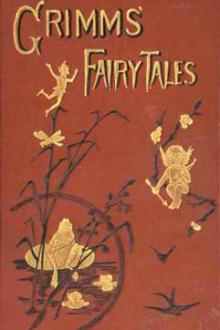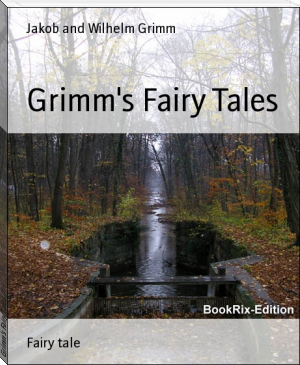Household Tales, Wilhelm Grimm [good books to read for women TXT] 📗

- Author: Wilhelm Grimm
- Performer: -
Book online «Household Tales, Wilhelm Grimm [good books to read for women TXT] 📗». Author Wilhelm Grimm
to every question; the second was to say, “For money,” and the third, “And quite right too!” They were always to say this, one after the other, but they were not to say one word more, and if they disobeyed this order, all their money would disappear at once, but so long as they observed it, their pockets would always be full. As a beginning, he at once gave them as much as they could carry, and told them to go to such and such an inn when they got to the town. They went to it, and the innkeeper came to meet them, and asked if they wished for anything to eat? The first replied, “All three of us.” “Yes,” said the host, “that is what I mean.” The second said, “For money.” “Of course,” said the host. The third said, “And quite right too!” “Certainly it is right,” said the host.
Good meat and drink were now brought to them, and they were well waited on. After the dinner came the payment, and the innkeeper gave the bill to the one who said, “All three of us,” the second said, “For money,” and the third, “and quite right too!” “Indeed it is right,” said the host, “all three pay, and without money I can give nothing.” They, however, paid still more than he had asked. The lodgers, who were looking on, said, “These people must be mad.” “Yes, indeed they are,” said the host, “they are not very wise.” So they stayed some time in the inn, and said nothing else but, “All three of us,” “For money,” and “And quite right too!” But they saw and knew all that was going on. It so happened that a great merchant came with a large sum of money, and said, “Sir host, take care of my money for me, here are three crazy apprentices who might steal it from me.” The host did as he was asked. As he was carrying the trunk into his room, he felt that it was heavy with gold. Thereupon he gave the three apprentices a lodging below, but the merchant came upstairs into a separate apartment. When it was midnight, and the host thought that all were asleep, he came with his wife, and they had an axe and struck the rich merchant dead; and after they had murdered him they went to bed again. When it was day there was a great outcry; the merchant lay dead in bed bathed in blood. All the guests ran at once but the host said, “The three crazy apprentices have done this;” the lodgers confirmed it, and said, “It can have been no one else.” The innkeeper, however, had them called, and said to them, “Have you killed the merchant?”
“All three of us,” said the first, “For money,” said the second; and the third added, “And quite right too!” “There now, you hear,” said the host, “they confess it themselves.” They were taken to prison, therefore, and were to be tried. When they saw that things were going so seriously, they were after all afraid, but at night the Devil came and said, “Bear it just one day longer, and do not play away your luck, not one hair of your head shall be hurt.”
The next morning they were led to the bar, and the judge said, “Are you the murderers?” “All three of us.” “Why did you kill the merchant?” “For money.” “You wicked wretches, you have no horror of your sins?” “And quite right too!” “They have confessed, and are still stubborn,” said the judge, “lead them to death instantly.” So they were taken out, and the host had to go with them into the circle. When they were taken hold of by the executioner’s men, and were just going to be led up to the scaffold where the headsman was standing with naked sword, a coach drawn by four blood-red chestnut horses came up suddenly, driving so fast that fire flashed from the stones, and someone made signs from the window with a white handkerchief. Then said the headsman, “It is a pardon coming,”
and “Pardon! pardon!” was called from the carriage also. Then the Devil stepped out as a very noble gentleman, beautifully dressed, and said, “You three are innocent; you may now speak, make known what you have seen and heard.” Then said the eldest, “We did not kill the merchant, the murderer is standing there in the circle,” and he pointed to the innkeeper. “In proof of this, go into his cellar, where many others whom he has killed are still hanging.” Then the judge sent the executioner’s men thither, and they found it was as the apprentices said, and when they had informed the judge of this, he caused the innkeeper to be led up, and his head was cut off. Then said the Devil to the three, “Now I have got the soul which I wanted to have, and you are free, and have money for the rest of your lives.”
121 The King’s Son Who Feared Nothing
There was once a King’s son, who was no longer content to stay at home in his father’s house, and as he had no fear of anything, he thought, “I will go forth into the wide world, there the time will not seem long to me, and I shall see wonders enough.” So he took leave of his parents, and went forth, and on and on from morning till night, and whichever way his path led it was the same to him. It came to pass that he got to the house of a giant, and as he was so tired he sat down by the door and rested. And as he let his eyes roam here and there, he saw the giant’s playthings lying in the yard. These were a couple of enormous balls, and nine-pins as tall as a man. After a while he had a fancy to set the nine-pins up and then rolled the balls at them, and screamed and cried out when the nine-pins fell, and had a merry time of it. The giant heard the noise, stretched his head out of the window, and saw a man who was not taller than other men, and yet played with his nine-pins. “Little worm,” cried he, “why art thou playing with my balls? Who gave thee strength to do it?” The King’s son looked up, saw the giant, and said, “Oh, thou blockhead, thou thinkest indeed that thou only hast strong arms, I can do everything I want to do.” The giant came down and watched the bowling with great admiration, and said, “Child of man, if thou art one of that kind, go and bring me an apple of the tree of life.” “What dost thou want with it?” said the King’s son. “I do not want the apple for myself,”
answered the giant, “but I have a betrothed bride who wishes for it. I have travelled far about the world and cannot find the tree.” “I will soon find it,” said the King’s son, “and I do not know what is to prevent me from getting the apple down.” The giant said, “Thou really believest it to be so easy! The garden in which the tree stands is surrounded by an iron railing, and in front of the railing lie wild beasts, each close to the other, and they keep watch and let no man go in.” “They will be sure to let me in,” said the King’s son. “Yes, but even if thou dost get into the garden, and seest the apple hanging to the tree, it is still not thine; a ring hangs in front of it, through which any one who wants to reach the apple and break it off, must put his hand, and no one has yet had the luck to do it.” “That luck will be mine,” said the King’s son.
Then he took leave of the giant, and went forth over mountain and valley, and through plains and forests, until at length he came to the wondrous garden.
The beasts lay round about it, but they had put their heads down and were asleep. Moreover, they did not awake when he went up to them, so he stepped over them, climbed the fence, and got safely into the garden. There, in the very middle of it, stood the tree of life, and the red apples were shining upon the branches. He climbed up the trunk to the top, and as he was about to reach out for an apple, he saw a ring hanging before it; but he thrust his hand through that without any difficulty, and gathered the apple. The ring closed tightly on his arm, and all at once he felt a prodigious strength flowing through his veins. When he had come down again from the tree with the apple, he would not climb over the fence, but grasped the great gate, and had no need to shake it more than once before it sprang open with a loud crash. Then he went out, and the lion which had been lying down before, was awake and sprang after him, not in rage and fierceness, but following him humbly as its master.
The King’s son took the giant the apple he had promised him, and said, “Seest thou, I have brought it without difficulty.” The giant was glad that his desire had been so soon satisfied, hastened to his bride, and gave her the apple for which she had wished. She was a beautiful and wise maiden, and as she did not see the ring on his arm, she said, “I shall never believe that thou hast brought the apple, until I see the ring on thine arm.” The giant said, “I have nothing to do but go home and fetch it,” and thought it would be easy to take away by force from the weak man, what he would not give of his own free will. He therefore demanded the ring from him, but the King’s son refused it. “Where the apple is, the ring must be also,” said the giant; “if thou wilt not give it of thine own accord, thou must fight with me for it.”
They wrestled with each other for a long time, but the giant could not get the better of the King’s son, who was strengthened by the magical power of the ring. Then the giant thought of a stratagem, and said, “I have got warm with fighting, and so hast thou. We will bathe in the river, and cool ourselves before we begin again.” The King’s son, who knew nothing of falsehood, went with him to the water, and pulled off with his clothes the ring also from his arm, and sprang into the river. The giant instantly snatched the ring, and ran away with it, but the lion, which had observed the theft, pursued the giant, tore the ring out of his hand, and brought it back to its master. Then the giant placed himself behind an oak-tree, and while the King’s son was busy putting on his clothes again, surprised him, and put both his eyes out.
And now the unhappy King’s son stood there, and was blind and knew not how to help himself. Then the giant came back to him, took him by the hand as if he were someone who wanted to guide him, and led him to the top of a high rock. There he left him standing, and thought, “Just two steps more, and





Comments (0)